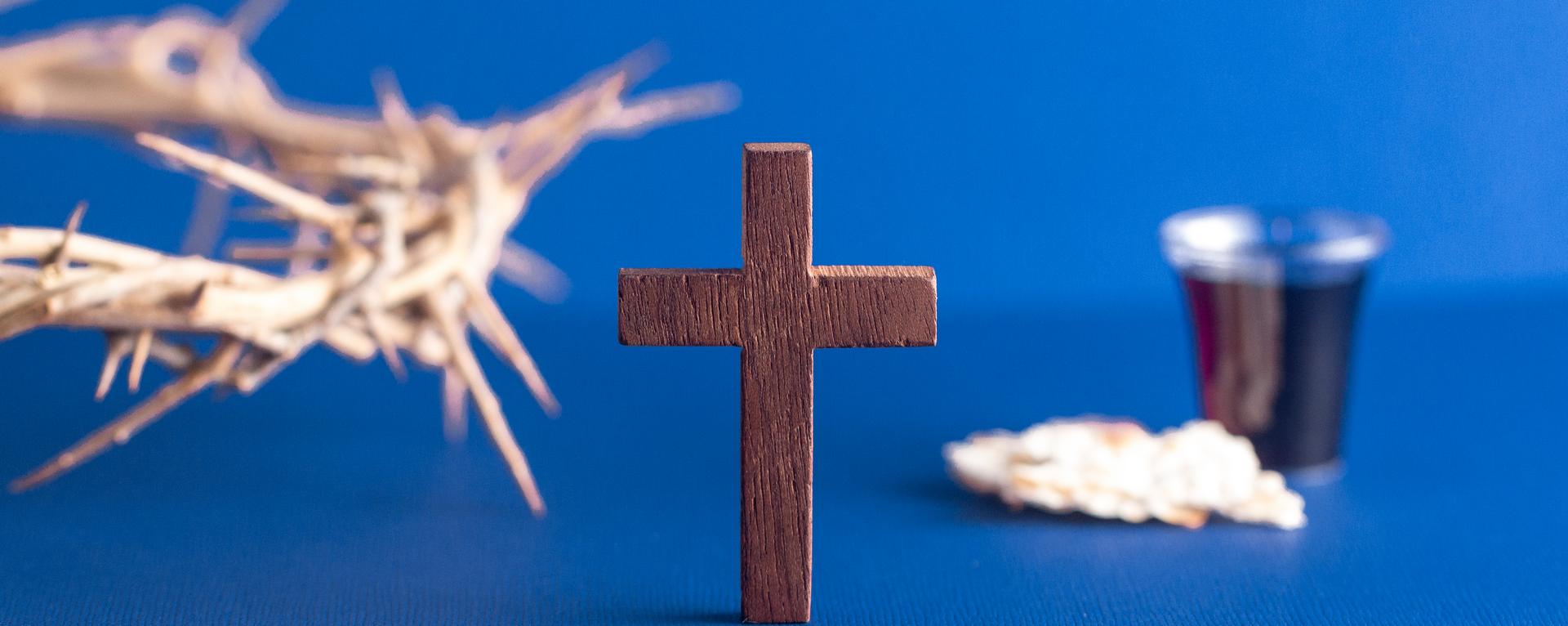What is…
The Lord’s Supper
also known as: The Last Supper, Communion, Holy Communion, The Lord’s Table, and Mass
“…do this in remembrance of Me.” —Luke 22:19 excerpt
The “Lord’s Supper” (1 Corinthians 11:20) is also called “the Lord’s table” (1 Cor. 10:21), “communion,” “cup of blessing” (1 Cor. 10:16), and “breaking of bread” (Acts 2:42).
Symbolized in The Passover
This was instituted by Jesus Christ during the last Passover meal before His death. It was attended by Jesus and His 12 original disciples.
- What is The Passover, the annual Feast of Unleavened Bread? and what is its importance?
In the early Church it was also called “eucharist,” from the Greek word eucharistia for “thanksgiving,” “giving of thanks.”
“And when He had taken a cup and given thanks, He gave it to them, saying, “Drink from it, all of you;” —Matthew 26:27
The Roman Catholic Church, some Lutheran churches (especially in Scandanavia), and some Anglican churches call it “mass,” a name derived from the traditional Latin Church end of service dismissal: Ite, missa est, meaning “go, you have been dismissed.”
The Biblical account of the institution of this ordinance is provided by Matthew, Mark, Luke and Paul.
This ordinance is not mentioned by the Apostle John.
Purpose of The Lord’s Supper ordinance
To commemorate the death of Christ: “This do in remembrance of me.”
To signify, seal, and apply to believers all the benefits of the new covenant. In this ordinance Christ ratifies his promises to his people, and they on their part solemnly consecrate themselves to Him and to his entire service.
To be a badge of the Christian profession.
To indicate and to promote the communion of believers with Christ.
To represent the mutual communion of believers with each other.
The elements used to represent Christ’s body and blood are bread and wine. The kind of bread, whether leavened or unleavened, is not specified. Unleavened bread was at that moment on the paschal [Passover] table. Wine, and no other liquid, is to be used (Matthew 26:26-29).
Believers “feed” on Christ’s body and blood, (1) not with their physical mouth in any manner, but (2) by their soul alone, and (3) by faith, which is the mouth or hand of the soul. This they do (4) by the power of the Holy Ghost. This “feeding” on Christ, however, takes place not in the Lord’s Supper alone, but whenever faith in him is exercised.
This is a permanent ordinance in the Church of Christ, and is to be observed “till He come” again (1 Corinthians 11:26).
Warning about partaking
The Apostle Paul shared an important warning.
For I received from the Lord that which I also delivered to you, that the Lord Jesus in the night in which He was being betrayed took bread, and when he had given thanks, He broke it and said,
“This is My body, which is for you. Do this in remembrance of Me.”
In the same way He took the cup also after supper, saying,
“This cup is the new covenant in My blood; do this, as often as you drink it, in remembrance of Me.”
For as often as you eat this bread and drink the cup, you proclaim the death of the Lord until He comes.
Therefore whoever eats the bread or drinks the cup of the Lord in an unworthy manner, shall be guilty of the body and the blood of the Lord. But a man must test himself, and in so doing he is to eat of the bread and drink of the cup. For he who eats and drinks, eats and drinks judgment to himself if he does not judge the body rightly. For this reason many among you are weak and sick, and a number sleep. But if we judged ourselves rightly, we would not be judged. But when we are judged, we are disciplined by the Lord so that we will not be condemned along with the world. —1 Corinthians 11:23-32 LSB
What is an “unworthy manner”?
Dr. John MacArthur explains that this involves participation…
“…indifferently… ritualistically… with an unrepentant heart, a spirit of bitterness, or any other ungodly attitude. To come to the Lord’s table clinging to one’s sin not only dishonors the ceremony, but it also dishonors His body and blood, treating lightly the gracious sacrifice of Christ for believers. It is necessary to set all sin before the Lord, then partake, so as not to mock the sacrifice for sin, by holding on to it.
…When believers do not properly judge the holiness of the celebration of communion, they treat with indifference the Lord Himself-His life, suffering, and death (cf. Acts 7:52; Heb. 6:6; 10:29). …The offense was so serious that God put the worst offenders to death, an extreme but effective form of church purification (cf. Luke 13:1-5; Acts 5:1-11; 1 John 5:16).” —Dr. John F. MacArthur Jr., MacArthur Bible Commentary
More information
- What is The Passover?
- Communion
- Church
- Covenant of Grace
- MASS—How the Protestant Church and Catholic Church differ on the Lord’s supper ordinance—Go
- About bread in the Bible
- About wine in the Bible
- Christ
- What and who is the The Messiah?
- How do we know that Jesus was the Messiah? Answer
- How did Jesus Christ die?
- If Jesus is God, how could he die? If Jesus died on the cross, then how can he be alive today? Answer

About JESUS CHRIST—Answers to frequently-asked-questions
